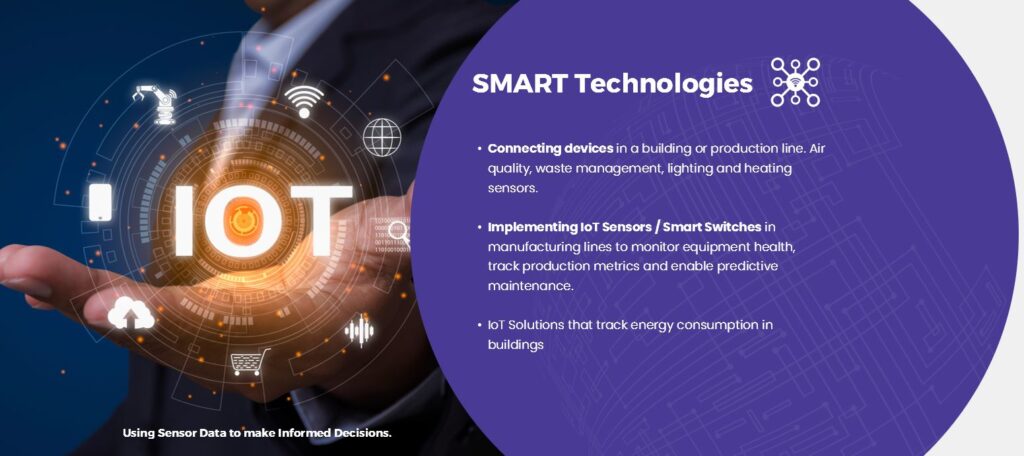IoT stands for the Internet of Things. It refers to a network of physical objects or “things” embedded with sensors, software, and connectivity capabilities, allowing them to collect and exchange data over the internet. These objects can be everyday devices, such as household appliances, wearable devices, vehicles, or industrial machinery.

How can it help my business?
The key idea behind IoT is to enable these objects to communicate with each other and with humans, creating a vast network of interconnected devices. This network allows for seamless data sharing, automation, and intelligent decision-making based on the collected information
The Internet of Things (IoT) can provide numerous benefits to small businesses. Here are several ways in which IoT can help small businesses:
- Enhanced operational efficiency: IoT devices can collect and transmit real-time data, allowing small businesses to monitor and optimize their operations more effectively. For example, sensors can track inventory levels, monitor equipment performance, and streamline supply chain processes, enabling better resource management and reducing inefficiencies.
- Cost savings: IoT devices can help small businesses reduce costs in various ways. By automating routine tasks and processes, businesses can reduce labor expenses and improve productivity. Smart energy management systems can optimize energy usage, leading to cost savings on utility bills. IoT-powered predictive maintenance can prevent equipment breakdowns and costly repairs by identifying maintenance needs in advance.
- Improved customer experience: IoT enables small businesses to provide enhanced customer experiences. For instance, retailers can use beacons and connected devices to deliver personalized offers and recommendations to customers based on their preferences and location. Smart devices can also gather data on customer behavior and preferences, helping businesses tailor their products and services to meet customer demands more effectively.
- Enhanced safety and security: IoT devices can enhance security measures for small businesses. Video surveillance systems equipped with IoT technology can monitor premises, deter theft, and provide remote access for business owners to view real-time footage. IoT-enabled alarm systems can alert business owners and authorities in case of emergencies, such as break-ins or fire outbreaks.
- Data-driven decision-making: IoT generates vast amounts of data that can be leveraged for informed decision-making. By analyzing the data collected from IoT devices, small businesses can gain valuable insights into customer behavior, market trends, and operational efficiency. These insights can help businesses identify areas for improvement, optimize their strategies, and make data-driven decisions.
- Remote monitoring and management: IoT allows small business owners to monitor and manage their operations remotely. Whether it’s overseeing inventory levels, tracking equipment performance, or controlling security systems, IoT-enabled devices and applications provide real-time access to essential business information from anywhere, facilitating remote management and increasing flexibility.
- Expansion of business models: IoT opens up new opportunities for small businesses to innovate and expand their business models. For example, businesses can offer IoT-enabled products or services that provide additional value to customers. By incorporating IoT technology into their offerings, small businesses can differentiate themselves in the market and tap into new revenue streams.
It’s important for small businesses to carefully plan and implement IoT solutions to ensure data privacy and security. Additionally, considering scalability, interoperability, and long-term maintenance requirements will help businesses maximize the benefits of IoT technologies.
If you have a Digital Transformation Plan and are focusing on one of the technologies above you may be eligible for DTFF funding.
